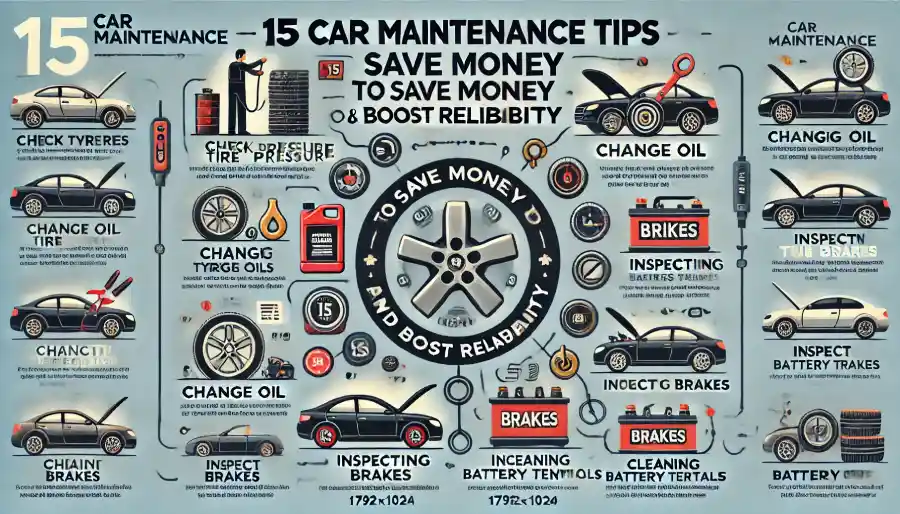15 Car Maintenance Tips to Save Money and Boost Reliability
Keeping your vehicle in excellent condition goes beyond just filling up the tank or washing it every few weeks. Regular car maintenance ensures that your car is safe, reliable, and retains its value. Well-maintained cars tend to have fewer issues, saving you time and money on repairs and boosting resale value.
Ready to keep your vehicle running smoothly? Here are 15 essential car maintenance tips every car owner should know, complete with a handy downloadable checklist to keep you on track.
Car Maintenance Tips
Check Tire Pressure
Proper tire pressure improves fuel efficiency, ensures safe handling, and extends tire life. Aim to check your tire pressure once a week, especially during seasonal temperature changes. Use a digital or manual tire pressure gauge, and consult your car’s manual for the recommended PSI (pounds per square inch).
Inspect Fluid Levels
Keeping your fluids at optimal levels is crucial to prevent overheating, corrosion, and part failure. Key fluids to check include windshield washer fluid, coolant, and transmission fluid. A weekly check ensures you’re always prepared, especially for long drives.
Clean the Battery Terminals
Corrosion on battery terminals can interrupt power flow. Once a month, visually inspect the battery for corrosion (white powder on the terminals). If present, clean the terminals carefully with a brush and a mixture of baking soda and water.
Inspect All Lights
Check all exterior and interior lights, including headlights, brake lights, indicators, and dashboard lights. A monthly inspection helps you spot issues early, improving your visibility and ensuring your vehicle is road-ready.
Clean the Interior and Exterior
Dirt and grime can wear down your car’s paint and damage the interior materials. Regularly wash the exterior, vacuum the interior, and wipe down surfaces to keep your car looking and feeling new.
Oil and Filter Change
Changing the oil is essential to keep your engine running smoothly and prevent overheating. Check your oil level regularly, and aim to replace the oil and filter every three months (or per manufacturer’s recommendation). This simple habit protects your engine and extends its lifespan.
Rotate Tires and Check Alignment
Rotating your tires prevents uneven wear, ensuring they last longer and your car handles better. You should rotate your tires every three months or 5,000 miles, whichever comes first. Consider a professional alignment check to keep the steering stable.
Brake Inspection
Your brakes are your car’s most important safety feature. Inspect the brake pads and rotors every three months. Listen for unusual noises or vibrations, as these can signal worn brakes or rotor issues.
Air Conditioning and Heating Check
Test your AC in the spring and your heater before winter. A lack of airflow or temperature changes may signal clogged filters, refrigerant leaks, or blower motor issues. Early inspections can prevent costly repairs and ensure comfort year-round.
Inspect Belts and Hoses
Belts and hoses can wear down or crack over time, especially during extreme weather changes. Check these for visible wear at the start of each season. Catching a weak belt early can save you from roadside breakdowns.
Battery Health Check
Car batteries struggle in extreme temperatures, particularly in winter. Test your battery before winter to avoid being stranded in cold weather. Most auto shops offer free battery testing.
Keep a Maintenance Log
Tracking all services and repairs helps you stay organized and avoid missing critical maintenance tasks. A detailed log also adds value to your car if you decide to sell it, showing prospective buyers it’s well-maintained.
Use High-Quality Parts and Fluids
While cheaper alternatives can save you money short-term, high-quality parts and fluids often last longer and perform better. For replacements like air filters, spark plugs, and motor oil, it’s best to follow the manufacturer’s recommendations.
Drive Smoothly and Consistently
Hard braking, rapid acceleration, and aggressive driving add stress to your car’s parts, from brakes to the transmission. Practicing smooth driving can help your vehicle last longer, reduce wear and tear, and improve fuel efficiency.
Detailing and Routine Cleaning
Regular detailing preserves your car’s value by keeping the interior materials, exterior paint, and surfaces in top shape. Clean the carpets, condition leather seats, and polish the dashboard to maintain your car’s aesthetic and resale value.
When to DIY vs. Seek Professional Help
Knowing when to tackle maintenance yourself and when to hire a professional can save you money and prevent accidental damage. Simple tasks like fluid checks, tire pressure adjustments, and cleaning are easy to do yourself, but tasks like brake pad replacement, alignment, or belt adjustments should be left to a professional for safety.
Conclusion
By following these simple car maintenance tips, you can keep your car running smoothly, safely, and efficiently. Regular check-ups and professional maintenance are key to a long-lasting car.
Don’t wait for a problem to be fixed. Schedule regular maintenance at Central Avenue Automotive.
By investing a little time and effort, you’ll enjoy a smoother, safer, and more affordable driving experience.
Car Maintenance FAQ
How often should I rotate my tires?
Rotate your tires every three months or 5,000 miles, whichever comes first. Regular rotations prevent uneven wear and help extend tire life.
What type of oil is best for my car?
Consult your car’s manual for the recommended oil type and viscosity. Using the right oil keeps your engine running efficiently and prevents damage.
How can I tell if my battery needs replacing?
Look for signs like slow engine crank, dim lights, and corrosion on the terminals. Most car batteries last around three to five years, but a professional test will confirm its health.

